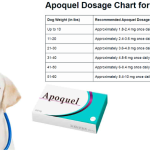Cytopoint is a breakthrough treatment for pets suffering from allergic dermatitis. It is a monoclonal antibody injection that blocks the itch signals in dogs, relieving itching and inflammation. But how long does it take for Cytopoint to work?
When injected, Cytopoint starts working within 24 hours and provides relief for up to 4 to 8 weeks, depending on the individual case. Unlike traditional medications, Cytopoint provides a targeted and specific treatment for allergic reactions, making it a practical and valuable option for pet owners.
To learn about Affordable Cytopoint Injection for Dogs, click here…
Key Takeaways
- Cytopoint is a monoclonal antibody injection for pets suffering from allergic dermatitis.
- Cytopoint starts working within 24 hours and provides long-lasting relief for 4 to 8 weeks.
- Unlike traditional medications, Cytopoint provides a targeted and specific treatment for allergic reactions.
What is Cytopoint and How Does It Work?
Cytopoint is also sometimes referred to as Lokivetmab, a prescription medication specifically innovated to fight those allergic symptoms in dogs. This medication best treats atopic dermatitis, a commonly widespread skin condition in dogs that causes itching, redness, and inflammation.
Cytopoint targets and neutralizes a specific protein in the dog’s body called IL-31. By neutralizing IL-31, Cytopoint helps to reduce itching and scratching in dogs, providing them with much-needed relief.
Cytopoint Speed of Action
Once administered, Cytopoint typically stays in the dog’s body for several weeks, gradually wearing off over time. This means that the effects of Cytopoint may last longer than other medications used to treat atopic dermatitis.
The speed of action of Cytopoint can also vary depending on the individual dog. Some dogs may experience faster relief than others, while others may require multiple Cytopoint doses to achieve optimal results.
Cytopoint Effectiveness Timeline
Cytopoint is a relatively new medication that has shown promising results in treating allergic skin diseases in pets. Unlike traditional treatments, Cytopoint targets a specific protein in the immune system, which reduces itching and inflammation. The effectiveness of Cytopoint in pets varies depending on various factors, including the severity of the condition and the individual response of the pet’s immune system.
After administering Cytopoint, the initial results may appear within 24 hours, with some pets experiencing relief in as little as four hours. However, the duration of the medication’s effectiveness may vary between pets. Cytopoint can provide relief for up to 8 weeks, making it a convenient option for pet owners who want to reduce their pet’s suffering without administering medication as frequently as traditional treatments.
I’d like to point out that monitoring your pet’s condition and administering additional treatments if necessary is essential. While Cytopoint is an effective treatment option, it may not work for all pets, and some may require additional therapies to manage their symptoms fully.
Benefits of Cytopoint for Pets
Cytopoint is a highly effective treatment for pets with allergies and skin conditions. One of the most significant benefits of using Cytopoint is its therapeutic response. Cytopoint targets the specific proteins responsible for causing allergic reactions, providing quick relief from itching and other uncomfortable symptoms.
Cytopoint is an excellent choice for pets with allergies and skin conditions. Its therapeutic response, lack of harmful chemicals, and long-lasting relief make it a safe and effective treatment option that can significantly improve the well-being of pets.
Safe Usage of Cytopoint
- If you are considering using Cytopoint to treat your pet’s allergies, it is essential to know how to use it safely.
- The reaction time of Cytopoint can vary between pets, and it is typically effective within 24 hours of administration. To ensure the safe use of Cytopoint, it is crucial to follow the path your veterinarian shows carefully.
- Cytopoint is typically administered by injection, and it is essential to inject the correct dosage. Your veterinarian will guide the appropriate dosage based on your pet’s weight and other health factors.
As with any medication, Cytopoint may cause side effects in some pets. Monitoring your pet closely following treatment and reporting any adverse reactions to your veterinarian is essential. The safe use of Cytopoint involves following your veterinarian’s instructions carefully, administering the correct dosage, and monitoring your pet for any adverse reactions.
Factors Affecting Cytopoint’s Effectiveness
Knowing how long Cytopoint takes to work is essential, but it’s also crucial to understand the factors that affect its effectiveness. Cytopoint’s duration of effect can vary depending on several factors, including:
| Factor | Description |
| Pet’s health condition | The severity of the pet’s allergic reaction and overall health can impact how long Cytopoint remains effective. |
| The frequency of use | The duration of Cytopoint’s effects may differ depending on how often it is used. |
| SystemThe | e strength of the pet’s immune response can affect how long Cytopoint stays in their system. |
| Concomitant medications some | e medications may interact with Cytopoint and alter its effectiveness and duration of effect. |
It’s important to note that the exact duration of Cytopoint’s effects will vary from pet to pet. It lasts around four to eight weeks in most of the cases. But it can last up to 12 weeks in some other cases.
Potential Side Effects of Cytopoint
- Cytopoint has gained a lot of public support for treating all those allergic conditions in dogs. But we can’t deny the fact that it still has some of the side effects. These side effects are common, mild, and short-lived and can be treated at home using effective home remedies.
Allergic Reactions
- In rare cases, pets may experience an allergic reaction to Cytopoint. Signs of an allergic reaction could be swelling, hives, itching, vomiting, diarrhea, and difficulty breathing. If you notice these behavioral changes after administering Cytopoint to your pet, contact your veterinarian immediately.
Lethargy and Reduced Appetite
- Some pets may experience lethargy or a reduced appetite after receiving Cytopoint. These symptoms are usually mild and go away within a few days. If your pet seems unusually tired or refuses to eat for an extended period, contact your veterinarian.
Infections
- Cytopoint can suppress your pet’s immune system, increasing their infection risk. If your pet develops a fever, cough, or other signs of illness after receiving Cytopoint, contact your veterinarian.
- Cytopoint is a safe and effective treatment option for pets with allergies. While there are potential side effects, most pets tolerate Cytopoint well and experience significant relief from their allergy symptoms.
Conclusion
In conclusion, Cytopoint can be an effective treatment option for pets suffering from certain conditions. As discussed, it typically takes 24-48 hours for Cytopoint to start working in the body of pets. Its duration of effectiveness varies, but it can last up to 4-8 weeks.
- Enhance Pet Quality of Life: Cytopoint offers a significant improvement in living standards for pets with allergies.
- Follow Veterinary Guidelines: Always administer Cytopoint according to the instructions from your veterinarian for safety.
- Consider Pet’s Specifics: The effectiveness duration of Cytopoint varies based on size, weight, and health condition of your pet.
- Personalized Treatment: Tailor the Cytopoint treatment to meet your pet’s unique health needs for optimal results.










